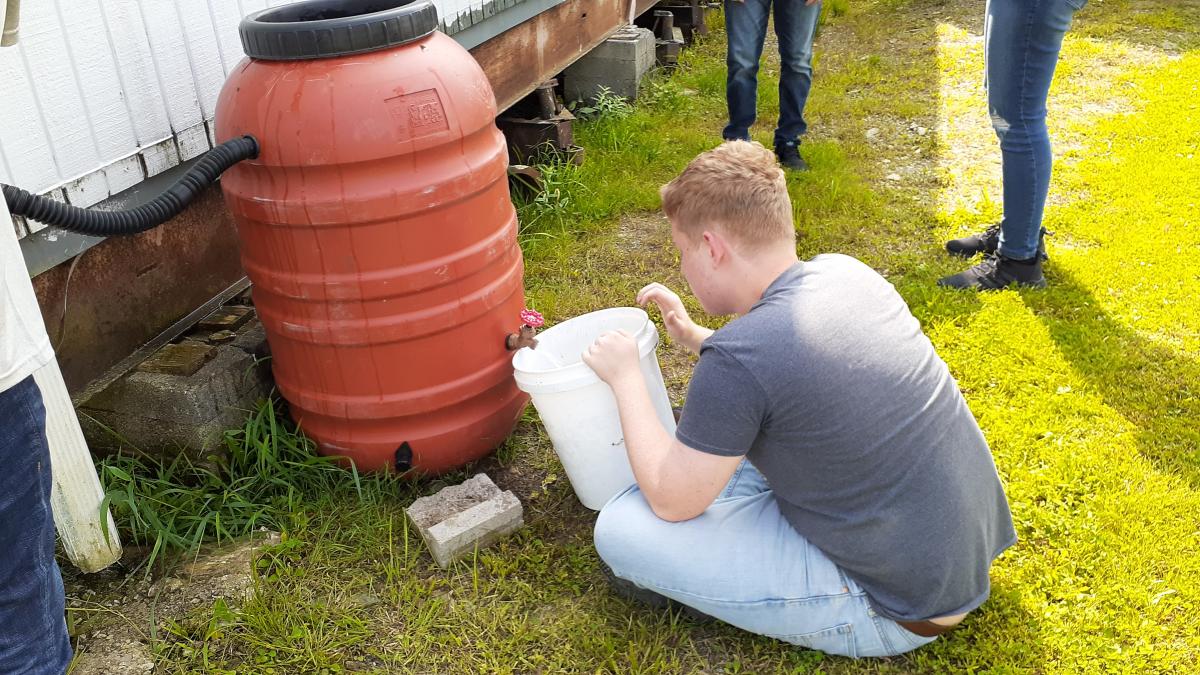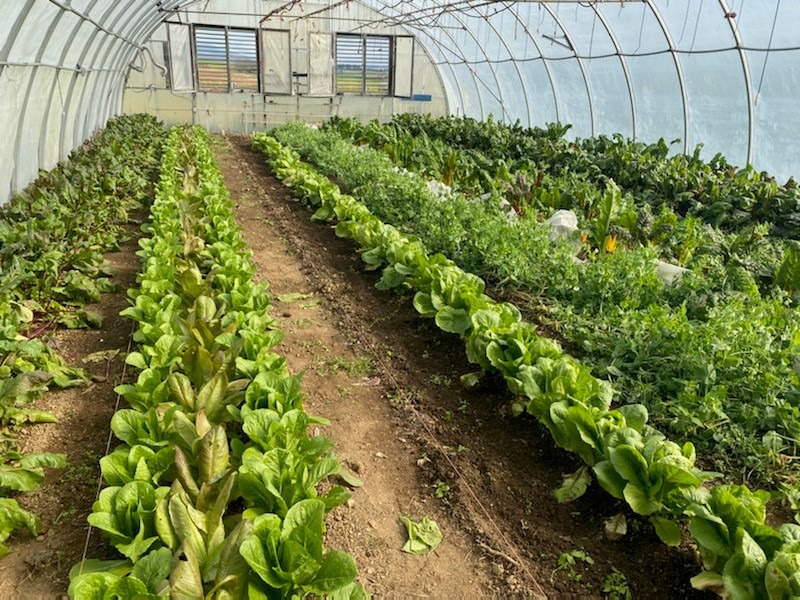
For the Beauty of the Earth
 Story by Jenevieve Lettsome & V. Michelle Bernard / Cover photos by Brad Barnwell
Story by Jenevieve Lettsome & V. Michelle Bernard / Cover photos by Brad Barnwell
Going on Sabbath walks and appreciating nature—God’s second book—are longstanding elements of Seventh-day Adventist culture. Should this appreciation impact the way members care for the environment? And can it bring them closer to God?
Adventism, [in its early years], was more outdoorsy because the culture back then was more connected with the [nature] around them,” says John Henri Rorabeck, a naturalist and educator. “[But] Ellen White and her contemporaries were [also] really pushing the boundaries and really leading.”
The Adventist health message, which includes getting lots of fresh air and sunshine and spending time in nature, was counterculture in a time when the sick and invalid were kept in dark and musty rooms, something that would be unthinkable today, he says.
While elements of this view remain in Adventist culture, Rorabeck laments that the conversations about eco-responsibility happening in the church now are about five or 10 years behind most scientists and nature lovers.
“We really need to be leading the way in caring for the rest of the planet, and showing them how we can really make a difference in sustainability and in health by getting outside,” adds Rorabeck, a member of Chesapeake Conference’s New Hope church in Fulton, Md. There have been many studies that show that “spending time in nature, [in fresh air and sunshine], even viewing pictures of nature or listening to sounds of nature, can positively impact people’s health,” he says.
Even spiritual health. “Connecting with the creation that God has made clearly brings us back to Who made us. … The more we connect with what God has made straight from the source, the more we’re going to get to know God.”
Rorabeck, who studied religion and adventure based youth leadership, finds cultivating an appreciation for creation is important. “As an educator, I’m able to, quoting Ellen White, ‘impress upon their minds the fact that if God cares so much for the trees and flowers, He will care much more for the creatures formed in His image’” (The Adventist Home, p. 223).
If you want to take care of this earth, learn how to live in it with minimal impact, Rorabeck continues. Turn off the sink while brushing your teeth. Turn off the lights after you leave a room. Stay on the hiking trails. Don’t litter, and clean your recycling before you sort it. These are ways to take care of the world in which we live.
He adds, “How we treat creation shows what we think of the Creator. How we act toward nature shows our true nature.”
DEVELOPING HABITS FOR THE FUTURE
Schools around the Columbia Union Conference are also striving to teach students about caring for the earth, using various activities such as installing solar panels and planting gardens.
 Mountain View Conference’s Highland Adventist School in Elkins, W.Va., recently received a rain barrel from the West Virginia Department of Environmental Protection (WVDEP) Division of Water and Waste Management to help provide water for their greenhouse growing program.
Mountain View Conference’s Highland Adventist School in Elkins, W.Va., recently received a rain barrel from the West Virginia Department of Environmental Protection (WVDEP) Division of Water and Waste Management to help provide water for their greenhouse growing program.
Besides being a water source and a learning opportunity for students, WVDEP notes that the barrel helps eliminate non-point pollution caused by melting snow or rain runoff that might pick up and carry away pollutants that would eventually end up back in the various water sources.
Principal Cheryl Jacko says, “I live and work in ‘coal country.’ Issues surrounding environmental stewardship have very real consequences for the families, communities and economies I serve. Solutions are not easy or simplistic. I believe our global responsibility regarding care of the earth is to continue to find safer, cleaner ways to generate power, provide transportation, care for refuse, etc. … I have no direct influence over the global and national decision-making regarding caring for our environment, but I can teach my students to make a difference in their sphere. So we promote and teach recycling, composting, reusing and reducing consumerism.”
 Besides having a USDA-certified organic farm that provides fresh produce and grains to community members through several food stands, Pennsylvania Conference’s Blue Mountain Academy (BMA) started conserving more energy seven years ago by simply converting 20 acres of lawn into hay fields. Prior to this, the school was spending $10,000 a year on fertilizer and spraying for dandelions.
Besides having a USDA-certified organic farm that provides fresh produce and grains to community members through several food stands, Pennsylvania Conference’s Blue Mountain Academy (BMA) started conserving more energy seven years ago by simply converting 20 acres of lawn into hay fields. Prior to this, the school was spending $10,000 a year on fertilizer and spraying for dandelions.
The school, located in Hamburg, has saved approximately 234-man hours in mowing time, 478 gallons of diesel (at approximately $1,200) and reduced wear and tear on machines, reports Ruben Olm, Enrollment and Development director, who adds that sale of the hay has averaged about $10,000 per year.
The school has also started a recycling program for paper, cardboard, plastics, glass, metal and food waste. “It is our goal that by learning and doing these things at BMA, our students will develop habits that will make them good environmental and fiscal stewards of the blessings that God gives them in the future,” says Olm.
PERSONALLY REAPING THE BENEFITS
Caring for the earth has other benefits too. Keiva Dennis, a member of Potomac Conference’s Seabrook church in Lanham, Md., first began following a whole-foods, plant-based diet more closely after spending time with her sister’s family, who ate that way. “Eating whole foods was so amazingly satisfying that I decided to continue this lifestyle,” she says.
 Already a vegan since college, she changed her previously highly refined and processed vegan diet to a more health-conscious one. But, like many other working adults who live busy lives, Dennis had to learn how to prepare her meals for the entire week. It was a challenge at first, but she eventually figured out how to prepare extra portions and store them in small containers in the freezer so she would have more diversity of meals during the work week.
Already a vegan since college, she changed her previously highly refined and processed vegan diet to a more health-conscious one. But, like many other working adults who live busy lives, Dennis had to learn how to prepare her meals for the entire week. It was a challenge at first, but she eventually figured out how to prepare extra portions and store them in small containers in the freezer so she would have more diversity of meals during the work week.
Dennis reports she has already begun to experience the many benefits of having a whole foods plant-based diet: her acne cleared up, she lost 20 pounds and her knee pain has disappeared, among other things.
From a financial point of view, she found that purchasing more whole foods and unprocessed groceries reduced her food budget. She also says that a plantbased diet benefits the planet through a more efficient use of resources, in terms of harvesting plants directly for human consumption rather than using plants to feed animals that will later be processed as food for human consumption.
A CALL FOR EARTH STEWARDS
Olive Hemmings, a professor at Washington Adventist University’s Religion Department, shares that Psalm 8 (and the Genesis account of creation), “offer praise for making humanity a little lower than God and then giving them dominion over all the works of God’s hands. To be made in God’s image is to love and care as God loves and cares for creation.”
She adds that sin marred creation and that the curse in Genesis 3:14–19 is a description of what happens as a result of human transgression. “Instead of being stewards and caretakers over each other in the created order, humanity has resorted to the “survival of the fittest” mode of existence. ... In short, the current environmental crisis is symptomatic of the sin culture— the culture of domination. … We live in competition among ourselves and with the rest of creation, pillaging, plundering, exploiting and oppressing each other, as we vie for domination, as though we are no better than the beasts of the wild.”
But Hemmings says, “The earth has been given to us to care for, not for us to mess up and then evacuate. If we do not care for this awesome gift of God to us, how can we be good stewards in heaven?”
 Read and share these articles from the March/April 2021Visitor:
Read and share these articles from the March/April 2021Visitor:
- Editorial: Make Me a Steward
- For the Beauty of the Earth
- Adventist Schools Help Students Develop Greener Habits for the Future
Take the Greener Earth Challenge - Association of Adventist Women Presents Weigley a Champion of Justice Award
- Download the Columbia Union App for This Month's Year of the Bible Devotionals

Add new comment